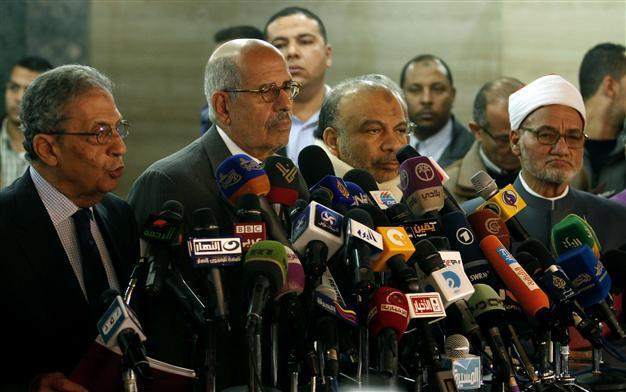Egypt factions seek dialogue, condemn bloodshed
CAIRO - Agence France-Presse

Former Egyptian presidential candidate Amr Moussa (L), Egyptian opposition leader and Nobel Prize Laureate Mohammed el-Baradei (2L), head of the Islamist Freedom and Justice Party (FJP) Saad al-Katatni (2R), and a representative of the Azhar scholars Nasr Wassel (R) attend a press conference in Cairo on January 31, 2013. AFP Photo
Rival factions in Egypt on Thursday condemned the violence which has killed dozens in a week of unrest and pledged support for a national dialogue to resolve the political crisis gripping the country.
Top Islamic scholar Grand Imam Ahmed al-Tayyeb chaired talks between liberal opposition heads, Islamists, youth groups, independents and church members at the headquarters of Al-Azhar, Sunni Islam's highest seat of learning.
They signed an Al-Azhar document vowing to support "a serious dialogue" and "condemn all forms of violence and incitement to violence," and stressing "the responsibility of the state and its security apparatus to protect citizens." "We come out of these talks with some sort of optimism" despite "the difficult challenges ahead," former UN nuclear watchdog chief Mohamed ElBaradei, a leader of the opposition National Salvation Front (NSF), said.
"We will do whatever we can with goodwill to build the trust of the Egyptian people," he told reporters.
Saad al-Katatni, head of the Freedom and Justice Party of Morsi's Muslim Brotherhood, stressed the need for compromise from all parties.
"There is no solution to the problems in our path for democracy without dialogue... Dialogue must have guarantees but no preconditions," he said.
"All topics are up for discussion and all participants said they were ready for compromises," Katatni told reporters.
Even with few concrete points agreed, the talks marked a blow for Egypt's Islamist President Mohamed Morsi whose calls for dialogue were snubbed by the opposition only last week.
But it remained to be seen whether the Al-Azhar document would carry weight on the street, where clashes between protesters and police have killed dozens since rallies marking the second anniversary of Egypt's uprising last week.
Opposition groups have already called for mass protests on Friday against Morsi, who is accused of betraying the revolution that brought him to the presidency and of consolidating power in the hands of the Brotherhood.
In a statement, the NSF said Egyptians should demonstrate across the country on Friday to protest against "a regime that seeks to impose its will on the people and is managing the country in the interest of the Muslim Brotherhood." It accused Morsi of "only defending the interests of the (Muslim Brotherhood) instead of being a president for all Egyptians." In Cairo, marches will head to Tahrir Square and to the presidential palace.
Egypt has been gripped by unrest since rallies last week marking the second anniversary of the uprising that toppled president Hosni Mubarak.
The protests turned violent on Saturday after a Cairo court sentenced 21 residents of the canal city of Port Said to death for their involvement in football-related violence last year.
Friday's protest will mark one year since the Port Said clashes that left 74 people dead.
In the capital, the health ministry said two more people had died from their injuries following clashes, bringing to 56 the number of deaths nationwide in a week of violence.
At the opening remarks of the Al-Azhar talks, Tayyeb said a "national dialogue including all segments of society is the only way to resolve all the difference." Such a dialogue would constitute a "guarantee against the monopolisation of power which leads to tyranny," Tayyeb said.
The meeting was the latest attempt to strike up a dialogue between political factions in a country deeply split between Morsi's Islamist allies and an opposition of leftists, liberals, Christians as well as religious Muslims.
